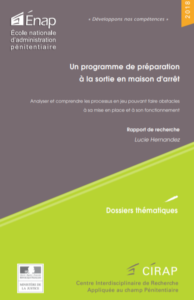Search inside Resources
Methodologies
- E-Learning (5)
- Reports/Presentations (52)
- Training modules/Database (20)
Topics
Author: Lt Col Dr Jarosław Rychlik, Professor, University of Justice
Introduction
Within the adopted plan, the following aspects of suicide risk are distinguished:
Read more here
Contributed by the Ecole nationale d’administration pénitentiare Département Gestion et Management
It is a particularly important moment – one that can only succeed if proper communication is established. An interview is a dialogue in which one person seeks to obtain information from another, with the latter’s consent. Proper communication means being able to express your objectives, expectations, and questions sincerely.
This also means creating the right conditions for a calm relationship. Finally, it means knowing how to listen, understand and respect. During the interview, we look at the individual as a whole, his feelings and his environment.
The aim is to analyse the needs, aspirations, values, and representations of individuals. We must not try to influence or change their opinions, except in exceptional circumstances. The supervisor conducting the interview must remain neutral.
Read more here
On 22-26 May in Târgu Ocna, the National Correctional Officers Training School hosted a training on Hostage-taking situations in the penitentiary environment with support from the Netherlands Helsinki (NHC) and EuroPris. As part of the EPTA II project, which is co-funded by the European Union’s Justice Programme, the EPTA network organized several cross-border trainings, where selected EPTA members hosted training in Ireland, Romania, and Croatia (will be hosted in 3-5 October) for participants from other EPTA member organizations.
If you are interested to read about the Cross-Border Training on Restorative Practice in Ireland Portlaoise, 17-18 May 2023, click here.
Click here to view the full report from this Training. (more…)
On 17-18 May in Portlaoise, the Irish Prison Service hosted a training on Restorative Practice, with support from the Netherlands Helsinki (NHC) and EuroPris. (more…)
These recommendations and guidelines are intended to serve as an initial guideline at the time of disclosure or discovery of sexual violence experienced by children and adolescents (CA) and are focused on two groups: a) the family and people close to the CA and b) the teams of professionals that are accompanying them from the revelation, with a clear purpose of reducing secondary victimization. (more…)
Click here to download “Covid19. Confinement et prison : Regards croisés des enseignants-chercheurs du Cirap sur la crise” (Covid19. Confinement and prison: Crossed views of CIRAP teacher-researchers on the crisis). The report is in French.
Click here to download a report called “Dire et prédire la radicalisation. Le cas de la prison” (Inform and predict radicalisation. The case of a prison) written by Guillaume Brie et Cécile Rambourg, June 2020. The report is written in French.
Click here to download the research on “Meaning of work among supervisory staff: What do the respect modules teach us?” written by Lucie Hernandez, July 2020.
The article is only available in French, the original title is “Sens du travail chez les personnels de surveillance : Que nous apprennent les modules de respect?”
Click here to view the full report in ENG, ES and FR.
For some years now, methods for managing people in detention have been rethought to be in line with legislative changes (the French “prison law” of 24 November 2009 on the meaning of the sentence; the French law of 15 August 2014 on the purposes of serving a sentence). (more…)
This catalogue compiles all research carried out integrally or partially financed by the Centre for Legal Studies and Specialised Training since 1987. (more…)
Click here to download “Le raisonnement organisationnel appliqué à l’analyse des prises en charge des délinquants sexuels” (Organizational reasoning applied to the analysis of care for sex offenders), Guillaume Brie, September 2019.
The Guidelines were developed as a follow-up to the 22nd Council of Europe Conference of Directors of Prison and Probation Services (Norway, June 2017). The text was drafted by the Council for Penological Co-operation (PC-CP) between 2018 and 2019. The Guidelines were adopted by the European Committee on Crime Problems (CDPC) at their 76th plenary meeting (25 April 2019).
EuroPris has cooperated with the Radicalisation Awareness Network (RAN) to collect trainings that were developed in a number of European Prison Services dealing with radicalisation issues. (more…)

Click here to open the Evaluation d’un programme de préparation à la sortie (A preparation programme for release from the remand centre), written by Lucie Hernandez, 2017. The report is written in French.
Click here to view “Recherche-action sur les programmes de prise en charge des auteurs d’infractions à caractère sexuel” (New issues related to the treatment of sex offenders. Mutually exclusive dimensions). Guillaume Brie, 2017. The report is written in French.
Click here to download the report Etude des obligations applicables en milieu ouvert : une analyse de la dimension coercitive de la probation (Study of applicable obligations in open custody: an analysis of the coercive dimension of probation), Clément Margaine, March 2016. The report is in French language.
Radicalisation. Analyses scientifique versus usages politiques (Radicalization. Scientific analyzes versus political uses), Guillaume Brie et Cécile Rambourg, September 2015.
Click here to view the report. The report is written in French language.
Click here to view the report La féminisation à l’épreuve de la prison (Feminisation put to the test of prison), written by Cécile Rambourg in April 2013. The report is written in French.
Click here to view the report Les trajectoires professionnelles des directeurs des services pénitentiaires : conformation à un modèle dominant de carrière (Career paths of prison directors: Conforming to a dominant career model), written by Laurence Bessières, December 2013. The report is written in French language.
Click here to view the report on L’expérience de la formation aux métiers pénitentiaires des travailleurs handicapés (The experience of training to prison trades for disabled workers), written in French by Cécile Rambourg, January 2012.
Search inside Resources
Methodologies


Supported by the Justice Programme of the European Union
